Benjamin’s Stash
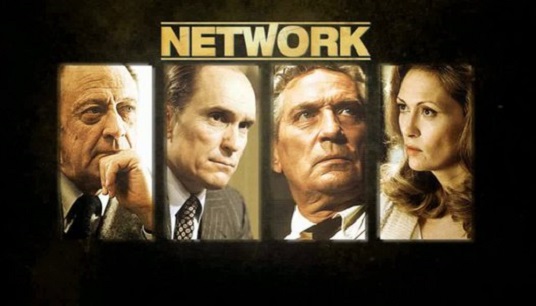
This might have aged a little too well.
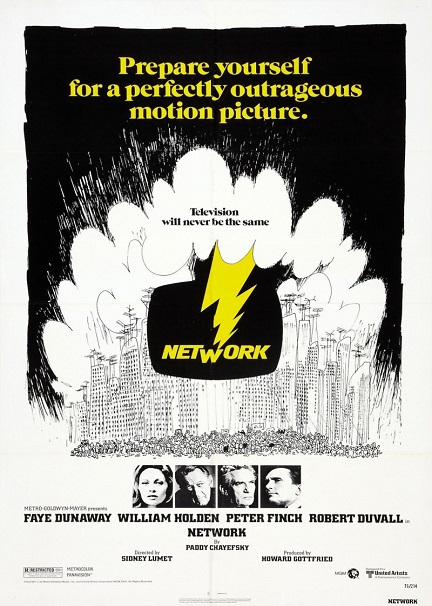
Cast of Characters:
Diana Christensen – Faye Dunaway
Max Schumacher – William Holden
Howard Beale – Peter Finch
Frank Hackett – Robert Duvall
Nelson Chaney – Wesley Addy
Arthur Jensen – Ned Beatty
Harry Hunter – Jordan Charney
Barbara Schlesinger – Conchata Ferrell
Bill Herron – Darryl Hickman
Sam Haywood – Roy Poole
Edward Ruddy – William Prince
Louise Schumacher – Beatrice Straight
Laureen Hobbs – Marlene Warfield
Director – Sidney Lumet
Writer – Paddy Chayefsky
Producer – Howard Gottfried
Distributor – United Artists
Running Time – 121 minutes
Rated R
Due to declining ratings at the Union Broadcasting System (UBS), longtime network anchor Howard Beale (Peter Finch) has been given news by his friend and news division president Max Schumacher (William Holden) that he has only two weeks left before he’s being let go. Beale takes the news very well, and shows America just how well by announcing on live television that he will “blow his brains out” on next Tuesday’s broadcast. Following his shocking on-air statement, Beale is fired immediately by network head Frank Hackett (Robert Duvall), but thanks to some intervening from Schumacher, he’s given another chance to have a more dignified farewell.
Beale uses this graciously granted opportunity to go off on a rant about life being “bull shit”.
Initially, the network is livid, and Schumacher doesn’t alleviate the situation any by allowing his friend more opportunities to vent his frustration. The network, however, changes their tune once they notice how much Beale’s outbursts have been causing their ratings to spike. That’s when inspiration strikes programming department head Diana Christensen (Faye Dunaway). Seeking one hit show, Christensen aims to turn Beale into the “mad prophet of the airwaves”. Yet while the head honchos see a ratings goldmine, Schumacher sees nothing more than objective journalism being twisted into the exploitation of his friend’s lunatic antics.
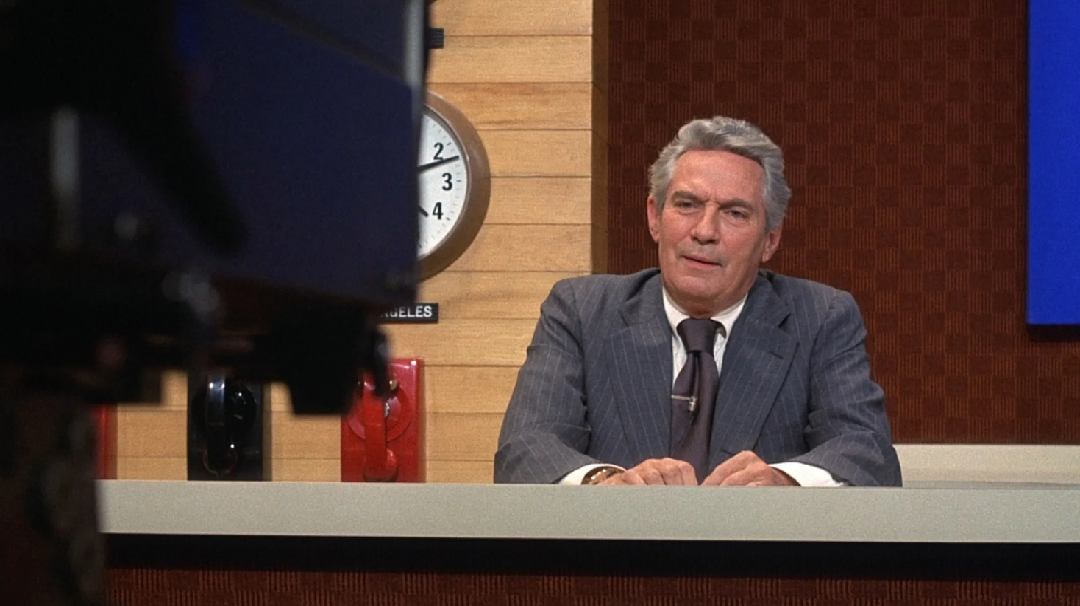
One of the most telling moments in Network takes place near the beginning of the film. Howard Beale, having just been given news of his firing, announces on live television that he’s going to kill himself.
However, that is not the telling part. What’s so telling is what takes place behind the camera. The producers, directors and crew members have their heads so wrapped around getting all the technical details of the show just right and making sure the right advertisements are in the right spot, they hardly noticed that the man they’re capturing on camera just announced on air that’s he’s gonna stick a gun to his head and pull the trigger. It’s not until someone within the crew finally utters, “Uh… did you hear that?”, that the light bulb finally begins to click on inside their heads.
In 1976, Network was viewed as nothing more than a great satirical drama. Far-fetched and absurd, but still great. That mindset was nearly five decades ago. Today, however, the media has morphed into twice the monster UBS becomes. Jerry Springer, Maury Povich, the O. J. Simpson trial, reality television, televangelism, 24-hour cable news, social media, every fucking election year – society has become inundated by exploitative, sensationalist trash and we gobble up all that bull shit by the spoonful like the dumb, fucking sheep we all are. In today’s world, ratings dictate job security; form and presentation outrank content, and if that means whoring yourself out to the public… so be it.
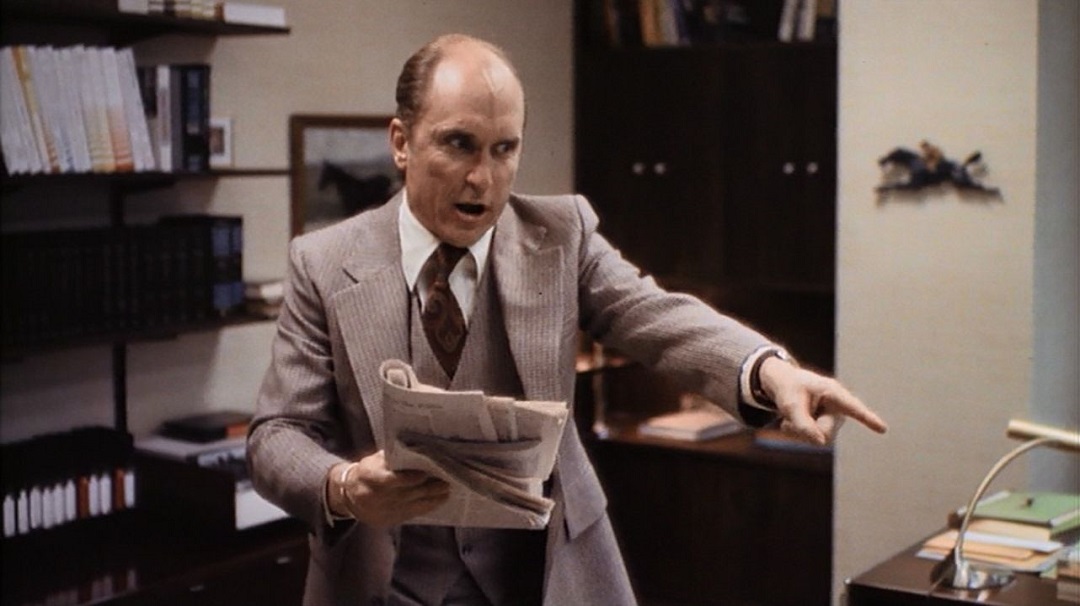
Three-time Oscar-winning writer Paddy Chayefsky doesn’t just lightly throw jabs at network news; he roasts it, impales it on a stake and rips it to shreds by way of a blistering attack that pulls no punches. While there is some conventional humor to be found here, Network overall isn’t funny. If one is to classify it as a comedy then it’s certainly a bleak, blackest of black comedies, one that often exaggerates its social commentary to hammer its point home (sometimes to comedic effect). The dialogue is brilliant and ripe with razor-sharp wit that explores not just the network numbers mumbo-jumbo, but also delves deep into the mindsets of the viewers watching at home that are hungry for anything scandalous, shocking or obscene.
Today, we call that clickbait.
Yet even Network at its most absurdly provocative doesn’t seem all that far-fetched today. Sure, as grotesquely sensationalist as the media has become, you still might balk at a news anchor announcing his suicide on live TV, but may I present to you the case of R. Budd Dwyer, the state treasurer of Pennsylvania for most of the ’80s. In 1987, upon receiving a conviction for embezzlement, he called for a news conference that many believed would be his resignation statement. In a way, it kinda was. He showed up to the conference looking nervous and agitated, and read a rambling prepared statement that threw many other state officials under the bus, claiming they were responsible for tarnishing his reputation. Following that statement, he then pulled out a .357 Magnum, stuck the gun in his mouth and shot himself dead.
That actually happened, and was broadcast in its entirety by some local networks, leaving everyone that witnessed it, whether in person or at home, absolutely stunned. Even before Network, Chayefsky was inspired to write the film after the death of Christine Chubbuck, a Sarasota, Florida news reporter who was battling depression and committed suicide on camera back in 1974.
The difference between then and now, though, is that both those incidents back then had everyone’s jaws dropping to the floor in horror. Today, we’d most likely not even bat an eye, or would shout out “Fake news!”, “Cheap fakes!” So, if anything, Network has over time sadly transformed from satire to being more true to life than any sane, level-headed person would ever hope for.
I mean, when I can’t tell the difference between real news and an Onion article…
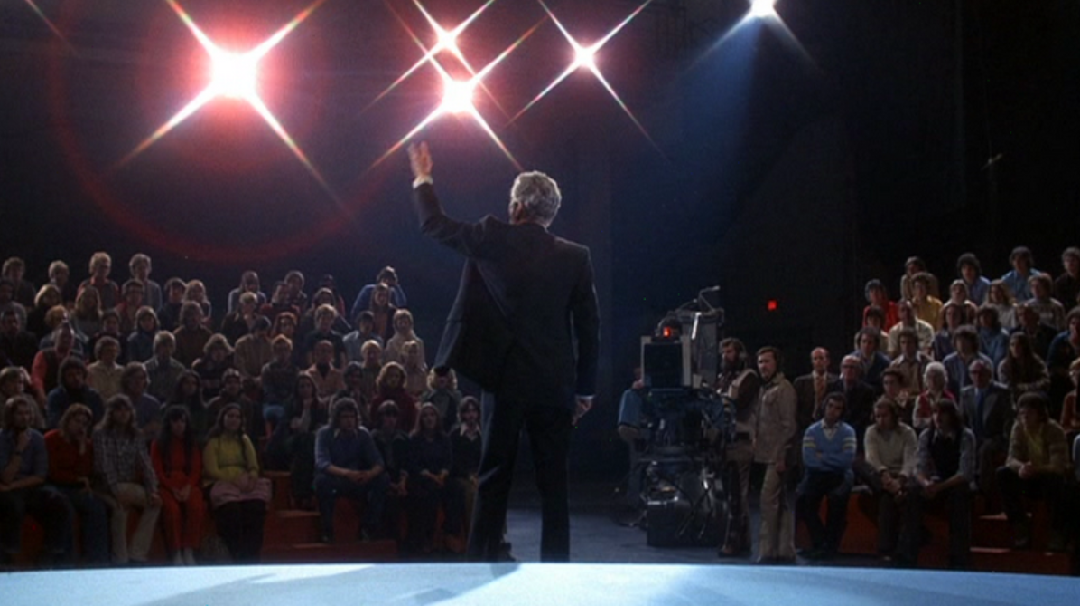
The late, great Sidney Lumet never reached the widespread appeal that Steven Spielberg and Martin Scorsese have achieved, but his name deserves to be mentioned among the best of the best, and he’s certainly in the conversation, along with Alfred Hitchcock and Stanley Kubrick, for being the greatest filmmaker to never win an Oscar. Oscar or no Oscar, though, his body of work speaks for itself: 12 Angry Men, The Pawnbroker, The Hill, Serpico, Murder on the Orient Express, Dog Day Afternoon, The Verdict, Power, Q & A, Find Me Guilty, Before the Devil Knows You’re Dead. Lumet was never what you’d call a “director’s director”, nor did he have a distinct style, but he always got the absolute best out of his actors (this film alone received five Oscar nods and three wins for acting) and he was one of the best ever at translating complicated stories to the screen.
Together, Lumet and Chayefsky have carved out a cinematic masterpiece. Considering the shifts in tone between each of the four connecting threads in Chayefsky’s script – the absurd, near-fantastical rantings of Beale, an equally over-the-top network deal Diana aims to score with a Communist liberation army, the quiet yet fierce love affair between Diana and Max, and the intense behind-the-scenes dealings from the network execs – it’s fair to say I probably wouldn’t be using the word “masterpiece” had this film been placed in filmmaking hands less skilled than Lumet’s. Lumet, however, effortlessly handles the shifts with smooth precision, and even when he changes gears with the story’s subplots that are steeped more in realism and edges them toward satire, he does so with subtlety. In doing so, it allows the shocking final act, which otherwise might have been a step too far, to be accepted as plausible without missing a beat.
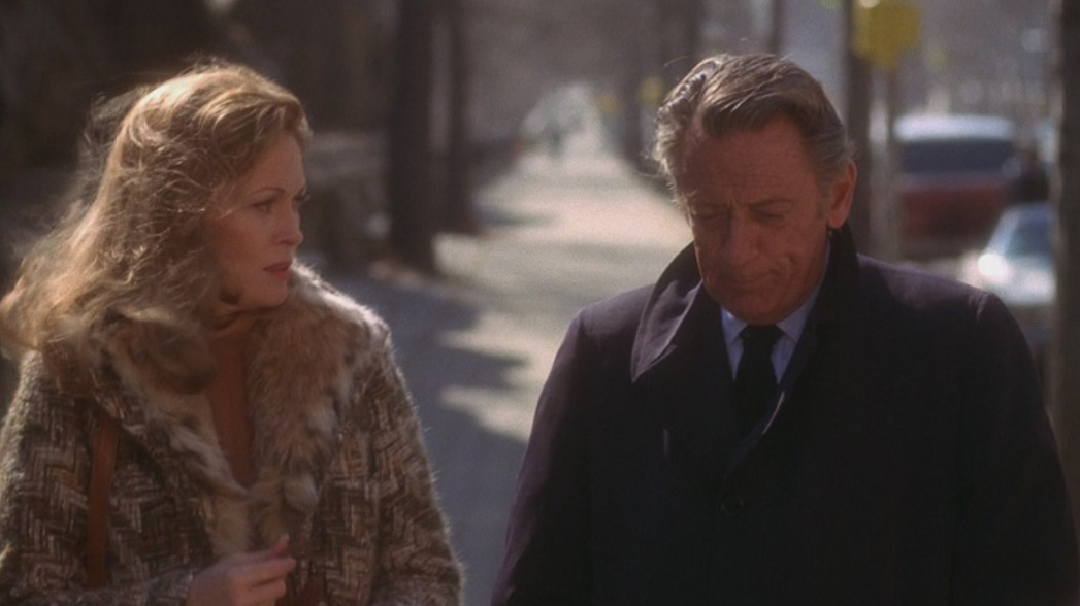
The Oscar-winning cast is absolutely magnificent, with many of the performers delivering some of the most accomplished work of their careers. Faye Dunaway, who would win Best Actress for her work in this film, is a force to be reckoned with here. As Christensen, Dunaway is smart, sassy, shrewd, manipulative and sexy. It doesn’t take a rocket scientist to see why a man like Max would fall so easily for her, but as her true colors begin to show over time, we understand all too well when he beings to wonder, “I’m not sure she’s capable of any real feelings.” William Holden brings depth and humanity to Max Schumacher, the news division head that feels immense sympathy for the way his friend is being exploited by the network, but also bears some guilt over letting the situation deteriorate to that point. Schumacher is far from being a saint, and developments that occur later on in the film will explain why. That said, he still is ultimately Network’s conscience, and Holden does a terrific job at turning Max into a character that audiences will empathize with most.
Rounding out the trio of leads, the absolutely captivating Peter Finch commands every single second of time he has onscreen. Finch unfortunately died about two months before the 1977 Academy Awards, but would still win for Best Actor, making him the first of only two to ever win an acting Oscar posthumously, the other being Heath Ledger for his role as the Joker in Christopher Nolan’s The Dark Knight. This was no maudlin sympathy award either, ’cause Finch is maniacal perfection here, walking a fine line between pure insanity and desperation, with just a touch of charisma to give cause to how an entire nation could instantly be drawn to him.
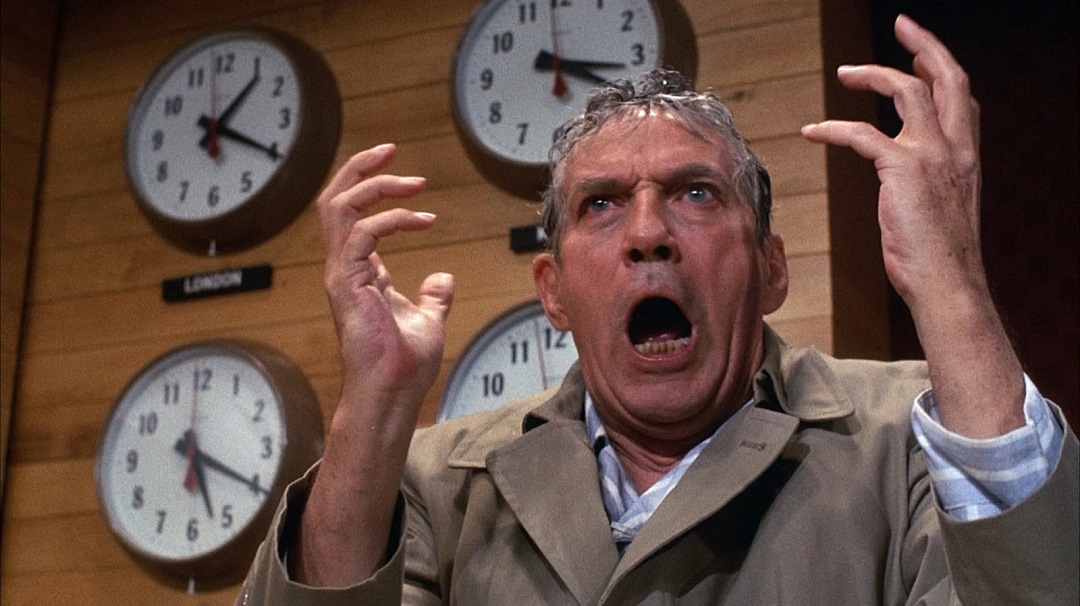
No question, Finch’s defining moment occurs halfway through the film, and it packs a wallop of an impact. In fact, his “I’m as mad as hell!” fit is not just his defining moment, it’s the entire film’s defining moment. Much like other great monologues such as Robert Shaw’s USS Indianapolis speech in Jaws, Rutger Hauer’s “tears in rain” soliloquy in Blade Runner, or Samuel L. Jackson’s fiery reciting of Ezekiel 25:17 in Pulp Fiction, Finch’s blistering rant has been forever immortalized and indelibly etched into the timeline of cinema.
The supporting cast is just as impressive. How impressive, you ask? Well, Beatrice Straight only needed about five minutes of screen time to win Best Supporting Actress, a record that still stands to this day. Straight and Ned “Yoooouu… willll… ATOOOONE!!” Beatty (who also received a Supporting Actor nod for his part here) may only appear for a brief amount of time, but they sure make it memorable. Straight’s moment of pouring out all her hurt to Holden for his infidelity is both powerful and heartbreakingly honest, and Beatty scores a scene-stealing moment with his “The world is a corporation” speech opposite Finch. In what must be his attempt to match Finch’s level of fire and brimstone, Beatty beautifully plays the scene like a malevolent Disney villain (and the way it’s shot and lit shows that is definitely Lumet’s intention), spitting out his words at Howard Beale with all the rage of the fires of hell before calmly asking, “… Am I getting through to you, Mr. Beale?” The invaluable Robert Duvall also adds another fantastic entry to his legendary resume, matching Dunaway’s shrewdness and calculation as the network boss who’ll do anything to revive his struggling company.
And by anything, I mean the type of anything that involves responding to the suggestion of an on-air murder with, “I’d like to hear some more opinions on that.”
Savagely funny, brutally honest and eerily prescient, Network takes aim at television hysteria and hits its mark dead-on with a searing takedown of network news’s blurring of journalism and entertainment that is all the more painfully credible and relevant today. Thanks to Sidney Lumet’s taut direction, Paddy Chayefsky’s impeccable script and an amazingly pitch-perfect cast, Network stands as one of the most powerful and thought-provoking films of not just the ’70s, but of all-time.
I can’t wait for next year when we can get a 50th anniversary Blu-ray release with “Based on true events!” slapped on the cover.
Stash Tier: Diamond Stash
